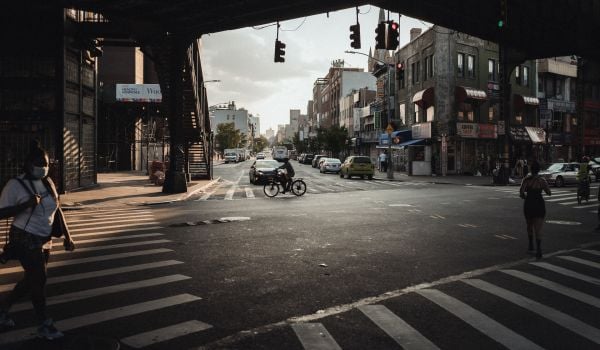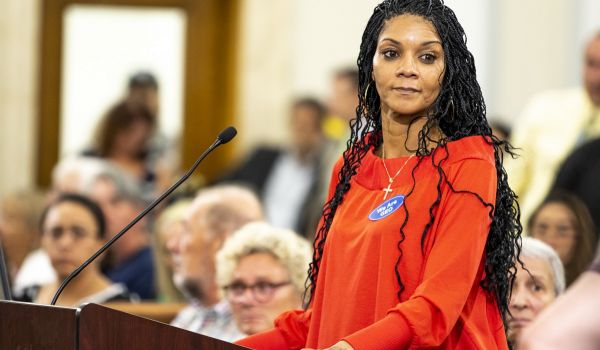Welcome to “The Mobile City,” our weekly roundup of noteworthy transportation developments.
New York Activists Press Gov. Hochul to Launch Congestion Charge Sooner Rather than Later
When the New York State legislature approved a bill allowing New York City to implement a congestion charge for motorists driving into Manhattan south of 60th Street in 2019, the Metropolitan Transportation Authority planned to implement the charge early this year.
But the pandemic and the Trump administration threw that schedule completely out of whack, and now, MTA officials say that Biden administration rules will push the start date into 2023.
That’s too late, say a group of New York City elected officials and community activists who demonstrated outside Gov. Kathy Hochul’s New York office Sept. 26 to press for a speedier timeline for implementation.
The New York Daily News reports that the MTA had held its first public hearing on the charge, required as part of a federally mandated assessment of the charge before it can implement it, last Thursday (Sept. 23). In addition, no members have yet been appointed to a six-member mobility advisory board required under state law. Hochul’s predecessor, Andrew Cuomo, had the authority to fill the board seats effective last Nov. 20, but neither he nor Hochul have named any members.
Revenue from the congestion charge is slated to provide $15 billion of the $51.5 billion the MTA plans to spend on upgrading New York’s mass transit infrastructure in its 2020-2024 capital plan.
New York City Council member Brad Lander, who spoke at the demonstration, pointed out that the charge will bring benefits beyond revenue for transit improvements. “One good thing about congestion pricing is it doesn’t only generate new revenues for transit,” he said. “It produces new benefits in other ways as well because reducing car traffic into Manhattan is a fundamental way to give us cleaner air, to give us less congestion, to give us streets that are safe for cycling and walking.”
For its part, Hazel Crampton-Hays, a spokesperson for Gov. Hochul, told the Daily News that the governor “is committed to implementing congestion pricing efficiently and effectively, and we appreciate the input of these advocates as we work to ensure a strong transportation network for all.”
Idaho Law Hobbles Boise’s Ability to Improve Its Transit Service
The Idaho Statesman reports that the $1 trillion infrastructure bill currently awaiting Congressional approval would bring some $200 million into Idaho for spending on transit improvements. That figure includes $2 million U.S. Rep. Mike Simpson (R-Idaho) earmarked for bus infrastructure improvements along 11 miles of State Street in Idaho’s capital and largest city, Boise.
“Many of these projects are long overdue and have been on city and statewide plans for decades, and their completion will have a huge economic impact in their respective communities,” Simpson said in a June statement announcing the federal approval of his earmark of $17 million for road and transit improvements in the state.
But a provision in Idaho law prevents the state’s cities from leveraging even more federal money for transit improvements, the Statesman article explains. That provision prevents local jurisdictions in the state from voting to tax themselves to pay for enhanced services such as public transit via sales tax add-ons.
Matt Stoll, the executive director of COMPASS, Boise’s regional transportation planning agency, told the Statesman that this law prevents agencies like Valley Regional Transit from applying for federal grants that require local matching funds.
And this inability to pay for transit improvements will hamper the state’s growth in the near term, said Vanessa Fry, a Boise State University professor who also heads the school’s Idaho Policy Institute.
In a telephone interview with the Statesman, she said that the state could no longer handle its surging population — Idaho’s population grew by 17 percent over the last decade, second only to Utah — simply by building and widening roads.
“We know that’s not a long-term solution. It becomes prohibitively expensive to move a growing population around more efficiently and effectively,” Fry said. “More people in cars means they’re less productive, spending less time at work, less time with family, and less healthy, and [Idaho] becomes a less desirable place to live. And more vehicles on the road means more wear and tear on the road, so it certainly adds more costs to maintaining the system that we have.”
Boulder Officials Want Written Guarantee of Better Service from RTD
According to a Colorado Public Radio news story, Boulder County officials frustrated with efforts to get the Denver Regional Transportation District (RTD) to provide more and better transit service in the county are now pressing the transit agency to commit to better service in writing.
“Our main concern is that RTD has gotten an enormous amount of federal funding to restore a service. And we’re not seeing any results from that money here in Boulder County,” Boulder County Commissioner Claire Levy said in an interview with CPR. “We’re seeing people returning to work, but not having the option of using transit.”
The RTD has received more than $700 million in federal stimulus money during the pandemic. RTD officials say they’re caught between a rock and a hard place: the agency is providing 70 percent of its pre-pandemic level of service but lacks the personnel needed to raise that level further. In addition, it faces huge debt service payments, a $300 million maintenance backlog and continued pressure from member counties, including Boulder, to add more rail service.
Boulder County officials seek an intergovernmental agreement among local governments, the RTD and the Colorado Department of Transportation that would direct money to specific local transit services. One of Boulder County’s top priorities is the Flatiron Flyer express bus service between Denver and Boulder, but the county also seeks money to support non-RTD transit service in some of its smaller towns.
An independent committee appointed by Gov. Jared Polis (D) has also recommended such agreements. “The federal government provided dedicated stimulus dollars specifically for the purpose of protecting the continuity of transit service for commuters and businesses in the Boulder area,” Elizabeth Kosar, a spokeswoman for the governor, wrote in an email. “Boulder County is right to demand accountability for those dollars being used as they were intended for their area.”
Know of a development that should be featured in this column? Send a Tweet with links to @MarketStEl using the hashtag #mobilecity.

Next City contributor Sandy Smith is the home and real estate editor at Philadelphia magazine. Over the years, his work has appeared in Hidden City Philadelphia, the Philadelphia Inquirer and other local and regional publications. His interest in cities stretches back to his youth in Kansas City, and his career in journalism and media relations extends back that far as well.
Follow Sandy .(JavaScript must be enabled to view this email address)
















